I am trying to develop a Binary search tree that can store duplicate values. Please see the problem below.
Sample Case:
Below is my Code:
#include<stdio.h>
#include<stdlib.h>
long int N=0; //Total number of nodes present
struct node
{
long int key;
long int count;
struct node *left, *right;
};
struct node* make(long int key) //To make a node
{
struct node *temp = (struct node *)malloc(sizeof(struct node));
temp->key = key;
temp->left = temp->right = NULL;
temp->count = 1;
return temp;
}
void inOrder(struct node *root) //Traverse inorder
{
if (root != NULL)
{
inOrder(root->left);
printf("%ld(%ld) ", root->key, root->count);
inOrder(root->right);
}
}
struct node* learn(struct node* node, long int key) //Insert Node
{
if (node == NULL){
N++;
return make(key);
}
if (key == node->key){
N++;
(node->count)++;
return node;
}
if (key < node->key)
node->left = learn(node->left, key);
else
node->right = learn(node->right, key);
return node;
}
struct node * minValueNode(struct node* node)
{
struct node* current = node;
while (current->left != NULL)
current = current->left;
return current;
}
//Completely delete the node
struct node* forget(struct node* root, long int key)
{
if (root == NULL)
return root;
if (key < root->key)
root->left = forget(root->left, key);
else if (key > root->key)
root->right = forget(root->right, key);
else {
N += -(root->count);
if ((root->left == NULL) || (root->right == NULL)) {
struct node* temp = root->left ? root->left : root->right;
if (temp == NULL) {
temp = root;
root = NULL;
}
else
*root = *temp;
free(temp);
}
else {
struct node* temp = minValueNode(root->right);
root->key = temp->key;
root->count = temp->count;
temp->count = 1;
root->right = forget(root->right, temp->key);
}
}
if (root == NULL)
return root;
return root;
}
//Decrease the count of node key by value n
struct node* decrease(struct node* root, long int key, long int n){
if (root == NULL) return root;
if (key < root->key)
root->left = decrease(root->left, key, n);
else if (key > root->key)
root->right = decrease(root->right, key, n);
else{
if (root->count > 1 && n < root->count){
N += -n;
(root->count) += -n;
return root;
}
N += -(root->count);
if (root->left == NULL)
{
struct node *temp = root->right;
free(root);
return temp;
}
else if (root->right == NULL)
{
struct node *temp = root->left;
free(root);
return temp;
}
struct node* temp = minValueNode(root->right);
root->key = temp->key;
root->right = decrease(root->right, temp->key, n);
}
return root;
}
//Find number of nodes larger than key
void largerNums(struct node* root, long int key, long int* lnums){
if (root == NULL)
return;
if (key < root->key){
(*lnums) += root->count;
largerNums(root->right, key, lnums);
largerNums(root->left, key, lnums);
}
else if (key >= root->key)
largerNums(root->right, key, lnums);
return;
}
//Find number of nodes smaller than key
void smallerNums(struct node* root, long int key, long int* snums){
if (root == NULL)
return;
if (key <= root->key){
smallerNums(root->left, key, snums);
}
else if (key > root->key){
(*snums) += root->count;
smallerNums(root->left, key, snums);
smallerNums(root->right, key, snums);
}
return;
}
//Find key'th element in ascending order
void asc(struct node* root, long int key, long int* cnt){
if (root != NULL) {
asc(root->left, key, cnt);
int i;
for(i=1; i <= (root->count); ++i){
(*cnt)++;
if(*cnt == key){
printf("%ld\n", root->key);
return;
}
}
asc(root->right, key, cnt);
}
}
//To compare strings
int myStrCompare(char a[], char b[]){
int c = 0;
while (a[c] == b[c]) {
if (a[c] == '\0' || b[c] == '\0')
break;
c++;
}
if (a[c] == '\0' && b[c] == '\0')
return 0;
else
return -1;
}
//To know which command user entered
int myCompare(char *str){
if(myStrCompare(str, "learn") == 0)
return 1;
else if(myStrCompare(str, "forget") == 0)
return 2;
else if(myStrCompare(str, "decrease") == 0)
return 3;
else if(myStrCompare(str, "smaller_nums") == 0)
return 4;
else if(myStrCompare(str, "larger_nums") == 0)
return 5;
else if(myStrCompare(str, "asc") == 0)
return 6;
return -1;
}
int main()
{
long int i, q, x, n, lnums, snums, cnt=0;
int choice;
char input[100];
struct node* root= NULL;
scanf("%ld", &q);
//printf("%s", input);
for(i=1; i<=q; ++i){
scanf("%s", input);
//printf("%s", input);
choice = myCompare(input);
//printf("\n%d", choice);
switch(choice){
case 1: scanf("%ld", &x);
root = learn(root, x);
break;
case 2: scanf("%ld", &x);
root = forget(root, x);
break;
case 3: scanf("%ld%ld", &x, &n);
if(n < 1){
break;
}else{
root = decrease(root, x, n);
}
break;
case 4: scanf("%ld", &x);
snums = 0;
smallerNums(root, x, &snums);
printf("%ld\n", snums);
break;
case 5: scanf("%ld", &x);
lnums = 0;
largerNums(root, x, &lnums);
printf("%ld\n", lnums);
break;
case 6: scanf("%ld", &x);
if(x > N){
printf("%d\n", -1);
break;
}else{
cnt=0;
asc(root, x, &cnt);
}
break;
/*case -1: inOrder(root); \\to know the current state of tree
printf(" N= %ld \n", N); \\to know total number of nodes
*/
}
}
/* root = learn(root, 5);
root = learn(root, 2);
root = learn(root, 7);
root = learn(root, 3);
root = learn(root, 2);
smallerNums(root, 5, &s);
printf("\n%ld\n", s);
largerNums(root, 2, &l);
printf("%ld\n", l);
asc(root, 2, &cnt); cnt = 0;
root = decrease(root, 2, 1);
asc(root, 2, &cnt); cnt = 0;
inOrder(root); printf("\n");
root = forget(root, 7);
printf("\n"); inOrder(root);
l=0;
largerNums(root, 2, &l);
printf("%ld\n", l);
root = forget(root, 5);
l=0;
largerNums(root, 2, &l);
printf("%ld\n", l);
*/
return 0;
}
My code is passing the sample test case, however when I submit my code, I getting TLE in 2 test cases in 2 wrong test cases(out of 10)
I am unable to understand what is going wrong in my code. I have spent almost 5 days trying to figure out. If you guys can help me then I will be grateful.
The reason for TLE that I suspect is due to the function smallerNums and largerNums because in these functions I am visiting each(almost) node recursively. It would be great if you guys could tell me how can I keep size of subtree at each node, so that I won't have to travers the whole of this tree.

